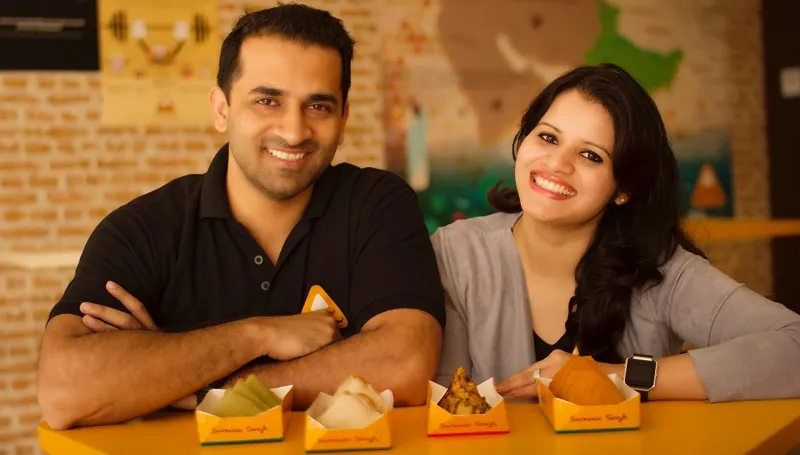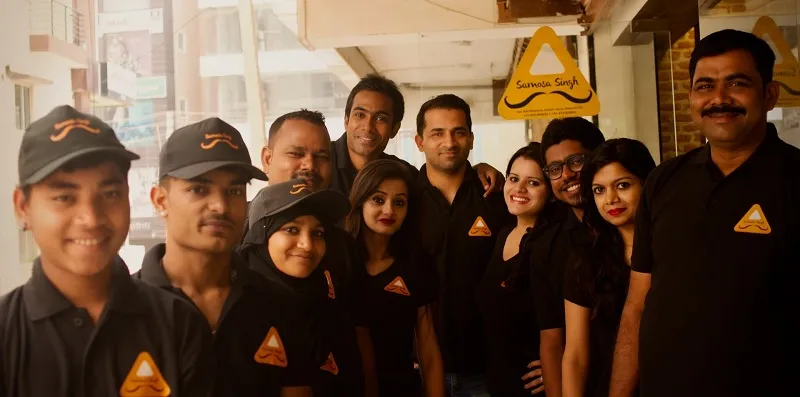Meet the husband-wife duo who sold their flat to build their dream business, Samosa Singh
The couple who modernised India’s favourite snack are now set to expand their retail presence in Hyderabad and Pune, and will soon offer a direct-to-consumer frozen range.
It was in April 2016 that Nidhi and Shikhar Singh spent a night for the very first time in their own apartment in the Bengaluru suburb of Yelahanka. The very next day, they sold the flat to invest the money into their startup.
Many entrepreneurs will relate to such gut-wrenching situations. Nidhi and Shikhar had started operations at their venture, WoknStove Foodworks Pvt Ltd, which sells innovative samosas under the brand name Samosa Singh, just two months earlier. The company needed to move to a larger and mechanised kitchen to start catering to corporate orders and needed to come up with money quickly. The choice was to either sell the flat or raise risk capital at a high stock dilution. They chose the former.
We had bought the flat for our own use. By selling the flat and investing the money into our business we were, in a way, making use of the flat for us. So no regrets. But I could not bring myself to attend the housewarming function that the new owners invited us for,” says Nidhi, 32.
The young couple—Shikhar will soon turn 32—is playing host to me in their bright little QSR outlet in Bengaluru’s IT hub, Electronic City. Over strong ginger tea and plates of their special samosas, the two tell me their story.

The seed is sown
Before we get to the part where this gritty husband-wife duo found success, we need to understand their back story. Nidhi and Shikhar met while studying biotechnology at Kurukshetra University. Nidhi, who realised she loved marketing and sales better than biotech, took up a business development job in the Delhi office of a US-based pharma company after graduating in 2007. Shikhar, who loved biotech, went to Hyderabad to pursue his master’s at the School of Life Sciences. It was here that Shikhar realised that there was no hygienic, fast food-like model available for Indian snacks. All fast-food restaurants offered pizzas and burgers; for Indian snacks and savouries, customers had to turn to street vendors.
He suggested starting a samosa kiosk to Nidhi. The seed of an idea was planted in their minds then.
Shikhar joined Biocon as a scientist in 2009 and the two got married a year later. Work took her across the globe, while he found contentment in the Biocon labs. But conversations at home kept coming back to samosas, or rather the business of samosas. Slowly, the seed grew roots and sprung shoots. The business plan was refined—offering hygiene wasn’t good enough, the product had to be innovative.
Here I butt in. Why samosas? Pat comes the answer.
Every region in our country has its own specialities. But you will find samosas in any part of India. Everyone in India will know what a samosa is. You don’t need to explain,” says Shikhar, the soft-spoken foil to Nidhi’s more aggressive salesperson persona.
In October 2015, the two finally decided to draw up a business plan and decide what their roles would be. On October 13, 2015, Shikhar got Nidhi to say yes once again – this time to starting up. He quit his job the same day.
The fledgling plant
Nidhi got her company to agree to a work-from-home arrangement. The two rented out a tiny kitchen, hired a few cooks and got down to R&D. For four months Shikhar innovated with different fillings and crusts while the cooks turned out batches of samosas.
The couple had a few things clear: they would start with a bang, with multiple interesting and unique flavours; their samosas had to be fried and not baked; and the samosas had to be non-greasy and healthy. These were tough asks and required all of Shikhar’s biotech experience.
The solution was two-fold: a crust with a unique dough composition that made it absorb less oil and shaping the crust into a shape different from traditional samosas (see product pic below).

The shape, Shikhar says, ensures the oil does not get absorbed. The samosas I am munching on leave no oil stains on my palms.
The fillings the team came up with range from chicken makhani (butter chicken) and kadai paneer to chocolate.
How did they come up with the catchy name? Shikhar just came up with it one day and it made Nidhi laugh, so the name stuck.
In February, after doing a few rounds of market testing, Nidhi and Shikhar opened the small QSR outlet in Electronic City. Nidhi manned the bill counter, while Shikhar fried the samosas (made in the tiny kitchen and transported to the outlet) with a few helpers and did the home deliveries. Business was brisk from the start and orders scaled up to 500 a day within two months. The brand has kept prices low. Rs 20 can get you a plate of aloo samosas (two pieces) and a plate of chicken makhani samosas (two pieces) will set you back by Rs 55.
Nidhi’s sales and marketing background kicked in and the two decided to reach out corporates. A lot of cold calling later, they got a meeting with a large corporate. The company, a German engineering giant, asked them if they could deliver 8,000 samosas a day. Nidhi and Shikhar asked for some time. That’s when they sold their flat and set up a bigger kitchen.
The day the kitchen was functional, the couple went back to the corporate who said they would give the two a week to get the 8,000 samosas ready.
It was time to go back to the drawing board. It was humanly impossible to make 8,000 samosas in a day. But they couldn’t fry different batches over a week and deliver — the taste would suffer. They spent two days on R&D. They broke down the samosa-making process, innovated to extend shelf life and by 8am on D-day the order was ready (the duo declined to share the secret sauce). That initial large order helped Samosa Singh perfect the product.
One of the main challenges of the business was the fragility of the product. Shikhar and his cooks innovated to ensure the crust and fillings would remain fresh without preservatives and would stay crunchy when finally fried. With a blast freezing mechanism, the un-fried product’s shelf life is an impressive six months. Remember, no preservatives.
“We turned our weakness into our strength,” Shikhar says.
Growing into a sturdy tree
Nidhi and Shikhar had decided that Samosa Singh would not take the QSR or own outlet route for expansion. They chose clients like INOX, PVR, Café Coffee Day and TCS. At INOX and PVR, Samosa Singh has its own branded kiosks. In total the company has seven outlets in Bengaluru.
To get in with corporates, Nidhi, the Chief Operating Officer at Samosa Singh, conducted week-long samosa fests.
“These generated a lot of revenue for us and we built loyalty among the corporate employees. They told their HR to get us permanently. Many of our on-going conversations with big companies are because of the good employee feedback during our samosa fests,” Nidhi says.
Earlier this year, the two realised they had a strong order pipeline but would need a larger and more automated and mechanised kitchen to keep expanding. They also knew that the next step would be to go multi-city and that the time was right to seek funding.
“Shikhar had heard of Kanwaljit Singh as someone who backed small companies. He told me to meet him,” Nidhi recalls.
That was easier said than done as she did not know anyone who could introduce her to Kanwaljit, a former Senior Managing Director at Helion Venture Partners who had started his own venture capital fund Fireside in 2015. Nidhi found a number, which turned out to be Kanwaljit’s home phone. She could not reach him by phone, so she stood outside his house for hours two days in a row. But that failed to result in a meeting. One weekend, she finally got Kanwaljit on the phone, leading to a meeting and then to the undisclosed funding in August.
Samosa Singh now operates out of a large highly automated kitchen that can easily meet the current order size of 10,000 samosas a day.
The founders were the reason I invested in Samosa Singh. They are very high on energy and very committed. Also, what was very attractive for me was the fact that they had experimented and created an almost modern version of an Indian classic. They had also got great traction even at an early stage. I also liked that we could come in at an early stage and provide value, help build the brand and build the B2B connects,” says Kanwaljit, who had not eaten a samosa in decades until he invested in Samosa Singh. “I still haven’t tasted their aloo samosa. I am a fan of their exotic range and love the chicken and chocolate samosas.”

The branches spread out
Samosa Singh is operationally profitable and is set to become profitable overall in a few months, Shikhar claims. The company is at a revenue run rate of Rs 5 crore but with the order pipeline it is sitting on, CEO Shikhar is confident of closing the financial year at Rs 8 crore revenue. They are targeting to scale up to 50,000 samosas a day just in Bengaluru next year.
The company is set to go multi-city in December through a deal with an entertainment outlet, which will see them piloting in Hyderabad and Pune. Shikhar could not disclose the name of the client due to a non-disclosure agreement.
The founders have taken the decision to keep production central in Bengaluru and transport frozen products through a cold chain partner to other cities. The samosas will be fried at the client location by people hired and trained by Samosa Singh.
“We want to control the quality and experience as much as possible,” Nidhi says.
Next on the agenda is introducing a direct-to-consumer frozen samosa range in 2018.
The innovations continue. The aloo samosas are now embossed with the name of the brand. Shikhar says theirs could be the first embossed fried food items in the world.
The company is also working on a triangular hot case (in sync with the triangular brand logo) that can keep the samosas fresh - and more importantly crisp - for hours.
The startup is also relaunching the much-loved “Chocossa” range on Christmas.
India has a massive food market—it was pegged at $193 billion last year. But it is not an easy business to be in with hundreds of businesses shutting shop each day.
Nidhi and Shikhar could learn a lesson or two from another F&B startup, Chai Point. Founder Amuleek Singh took the everyday Indian beverage, chai, and turned it into a brand in seven short years. Like Samosa Singh, Chai Point has also kept prices low. The latter started by retailing at tech parks and today runs about 100 outlets. It home delivers tea in insulated packs and recently launched IoT-enabled tea and coffee dispensers for corporates. A year ago, it had a presence in 100 corporate and 250 SME offices. Chai Point is registering 50 percent year-on-year growth and is the most recognised tea retail brand today.
By going behind the corporate market, Samosa Singh will be able to build predictability of orders. Its presence at entertainment venues like PVR and INOX is giving it a direct consumer connect. The B2C frozen samosa brand will give it entry into the mass retail segment. If Nidhi and Shikhar play their cards right, they could well build a multi-million food brand around the humble samosa.







